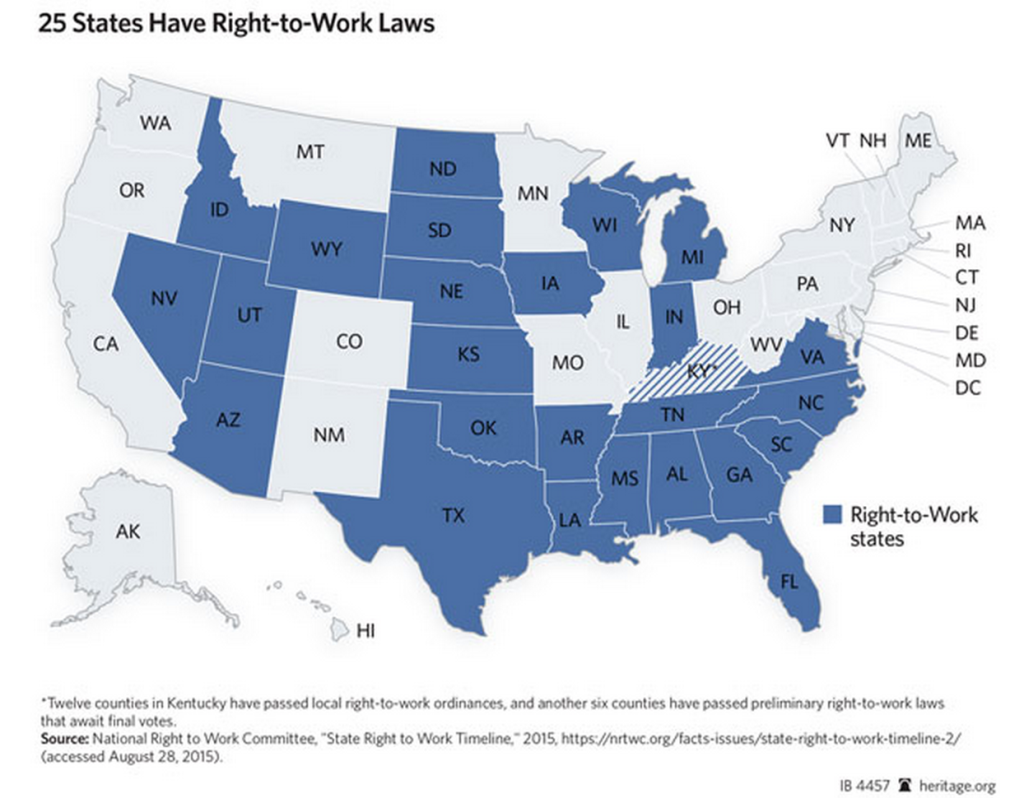
WASHINGTON — A recent study by the Heritage Foundation disputes the assertion that employees in right to work states such as Alabama are compensated at a lower rate that those in non-right to work states.
In right to work (RTW) states, businesses and industries can’t require union membership as a condition of employment. 25 states currently have RTW laws.

A paper published in April by the Economic Policy Institute (EPI) found a 3 percent average difference in worker compensation between RTW and non-RTW states, but didn’t adequately take cost-of-living into consideration according to James Sherk, a research fellow in labor economics at The Heritage Foundation and author of the Foundation’s report.
In the Heritage paper, Sherk replicated the research of the EPI and found it to be “fundamentally flawed” because it only partially controlled for cost-of-living differences among states. Once Sherk corrected for that consideration, the disparity disappeared completely.
“Policymakers have no economic justification for forcing workers to pay union dues,” Sherk wrote. “Workers who want to unionize have the right to do so. But the government should not force workers who see little benefit from union representation to purchase it.”
Unions were once widely viewed as a positive voice for workers who did not have the ability to stand up for themselves. But as workplaces became safer and wages more fair, unions started shifting from workplace representation to heavy political involvement to accomplish their goals. At only 7% of the private workforce, unions are now a shadow of their former selves, although they remain a powerful bloc in the Democratic Party.
Between the Mercedes, Honda, and Hyundai plants, Alabama has become a strong player in automotive manufacturing and the state’s RTW laws are often credited with having played a major part in that. As president and founder of Union Conservatives, Terry Bowman, stressed during a visit to Birmingham last year that UAW representation for Alabama’s auto manufacturers would not only be a blow to current jobs, but also to the state’s ability to attract new companies.
Earlier this year, an estimate by the Center for Automotive Research (CAR) found that the non-unionized Daimler Automotive Group employees at Alabama’s Mercedes plant in Vance, near Tuscaloosa, make more per hour than any other auto workers in the country.
CAR compiled estimates of the hourly labor costs, including wages, benefits, and legacy costs at each of the major U.S. automakers, and found Alabama’s Mercedes workers average $65 per hour, including benefits, compared to the $58 per hour at GM, $57 per hour at Ford, and $48 per hour at Fiat Chrysler, all of which are highly-unionized.
Several large companies have revealed Alabama’s status as a RTW state was a significant contributing factor to their decision to locate in the Yellowhammer State.
“That’s probably the second leading attractive part of being in the state of Alabama — a right-to-work state,” said Austal USA President Craig Perciavalle in an interview with Yellowhammer last year. “At the end of the day, we focus on treating our employees right and creating a very good work environment for them.”
Like this article? Hate it? Follow me and let me know how you feel on Twitter!
— Elizabeth BeShears (@LizEBeesh) January 21, 2015










